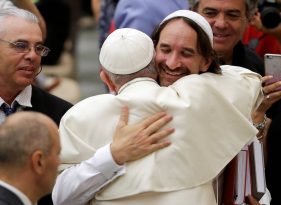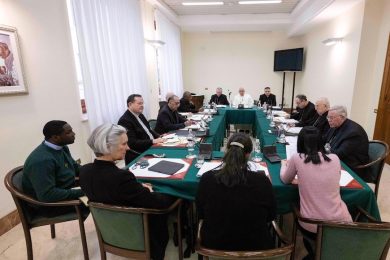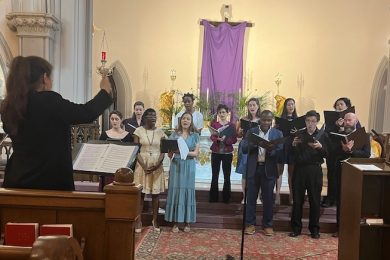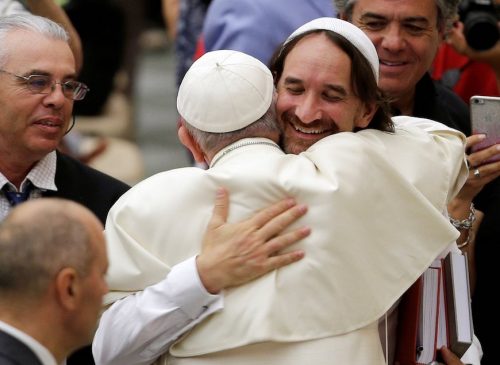By Carol Glatz | Catholic News Service
VATICAN CITY (CNS) — Pope Francis has not devalued the Torah and does not question the fact that the Torah is crucial for modern Judaism, Cardinal Kurt Koch told two prominent Jewish leaders.
“Pope Francis fully respects the foundations of Judaism and always seeks to deepen the bonds of friendship between the two faith traditions,” wrote the cardinal, who is president of the Vatican Commission for Religious Relations With the Jews.
The cardinal’s remarks were in response to concerns and requests for clarification regarding a catechesis the pope gave during an Aug. 11 general audience talk on St. Paul’s teachings regarding the role of Mosaic law for non-Jewish Christians. The cardinal’s remarks were contained in two letters published Sept. 10 on the website of the Pontifical Council for Promoting Christian Unity, which the cardinal also heads.
The letters, whose main text was the same, were addressed to Rabbi Rasson Arussi, chair of the commission of the chief rabbinate of Israel for the dialogue with the Holy See based in Jerusalem, and to Rabbi David Sandmel, vice chair of the New York-based International Jewish Committee for Interreligious Consultations. The two rabbis had both written separately to the cardinal in August, expressing similar concerns that the pope had seemed to suggest in his audience talk that Jewish law was obsolete.

The cardinal told the two rabbis that he had formulated his response only after consulting Sept. 3 with Pope Francis, “who has instructed me to respond to your letter.”
Pope Francis began his series of talks on St. Paul’s Letter to the Galatians in June. The pope explained over the course of several talks that the apostle was seeking to assure the Gentile Christians of Galatia that they were not bound to Mosaic or Jewish law. This stance that was firmly opposed to a group of Jewish-born Christian “fundamentalist missionaries” demanding that certain laws had to be observed in order to be saved, for example, the practice of circumcision and not sharing food or a table with “unclean” Gentiles.
The apostle argued that non-Jewish-born Christians were also children of God because they are descendants of Abraham, who preceded the law, but was heir to God’s promise and covenant because of his faith — not his observance to the law.
Throughout his Aug. 11 talk, Pope Francis described the importance of the Torah and how God’s gift of the law to Moses gave the scattered people of Israel guidance and reminded them of their covenant with God. St. Paul was not opposed to the Mosaic law, the pope said, and the commandments are valid; however, for Christians, their role is to lead them toward an encounter with Christ.
He said St. Paul defends the divine origin of the law and upholds its role in the history of salvation. “The law, however, does not give life, it does not offer the fulfillment of the promise, because it is not capable of being able to fulfill it. The law is a journey, a journey that leads toward an encounter,” and the law is like “the teacher that leads you by the hand toward the encounter. Those who seek life need to look to the promise and to its fulfillment in Christ.”
Reuters reported Aug. 25 that Rabbi Arussi wrote to Cardinal Koch and said the pope’s talk “presents the Christian faith as not just superseding the Torah, but asserts that the latter no longer gives life, implying that Jewish religious practice in the present era is rendered obsolete.”
“This is in effect part and parcel of the ‘teaching of contempt’ towards Jews and Judaism that we had thought had been fully repudiated by the church,” he said in the letter, quoted by Reuters.
In his reply, Cardinal Koch told both Rabbi Arussi and Rabbi Sandmel that “in the Holy Father’s address, the Torah is not devalued.”
The phrases concerning “the law does not give life,” he wrote, “should not be extrapolated from its context, but must be considered within the overall framework of Pauline theology.” The pope had explained in successive talks that his catecheses were reflections on St. Paul’s words and teachings — not his own — and that the apostle was speaking to Christians — not the Jewish people.
Cardinal Koch wrote that, “The abiding Christian conviction is that Jesus Christ is the way of salvation. However, this does not mean that the Torah is diminished or no longer recognized as the ‘way of salvation for Jews.'”
The pope was not referring to modern Judaism in his talk, but to the historical context of St. Paul’s letter, the cardinal wrote.
“The fact that the Torah is crucial for modern Judaism is not questioned in any way,” Cardinal Koch wrote, reminding them of “the positive affirmations constantly made by Pope Francis on Judaism” and that “it cannot in any way be presumed that he is returning to a so-called ‘doctrine of contempt,'” which refers to anti-Semitism rooted in a false reading of the Gospels that blames all Jews for the condemnation and death of Christ.
In a letter to the editor of La Repubblica newspaper, Sept. 2, Rabbi Riccardo Di Segni, chief rabbi of Rome, said whenever questions or subjects from 2,000 years ago are presented to a “wide public,” problematic situations will arise.
“To again propose ancient antagonisms in simplified terms carries the risk of confirming hostile stereotypes,” he wrote. “Handling these subjects requires caution and an evaluation of the repercussions.”






















